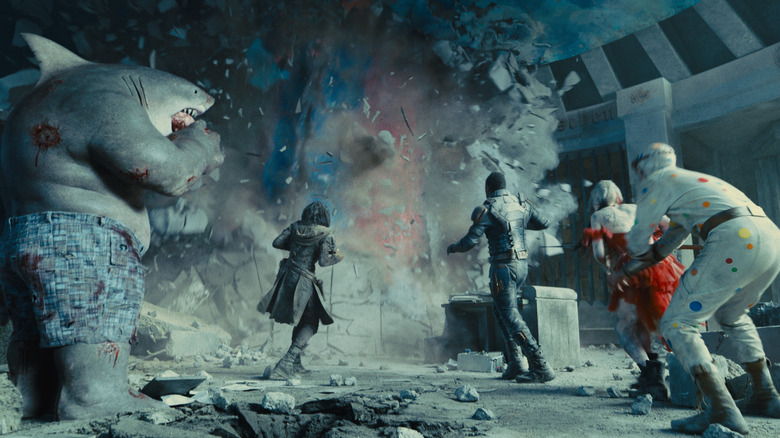Hollywood's Budget Problem And The Inevitable Reckoning That Must Come
Hollywood has a problem, and it's a problem that will need to be dealt with sooner rather than later. There are various reasons for this, but it has been a long time coming. Namely, budgets for blockbuster movies have, in many cases over the last decade or so, truly gotten out of hand. Now, as the business looks to transition into a streaming-first mentality, the great budget reckoning will come, one way or another.
Some Quick Movie Math
Before diving into the specifics of the budget problem and what might come about as a result, it's important to understand some very basic, rule-of-thumb movie math. It's not an exact science, but a rough understanding of the financial realities for a big movie is key to understanding the problem at hand.
The basic rule of thumb is that a movie's budget will double when accounting for marketing and other costs not directly related to the production. So, take a $100 million budget blockbuster. With marking, P&A (print and advertising), and other related costs, the studio will likely be out another $100 million, give or take. Spending that much money to make a movie means a lot of people need to see it. The way to get people to see a movie is to market the hell out of it. That is expensive. So, the cost for this movie would be around $200 million before it has earned a dime.
As for the box office, it is important to understand how the money is distributed. Let's say this hypothetical movie finishes its run at the domestic box office with $200 million. That's great. But about half of that will stay with the exhibitors, meaning only about $100 million will make it back to the studio. Give or take.
Internationally, things get a bit more complicated. China is the second-largest moviegoing nation in the world, and may well become the biggest, so it's hugely important to Hollywood blockbusters. But, only about 25% of box office dollars from China make it back to the studio, due to international taxes and other reasons. So, let's say a movie does gangbusters business in China. Another $200 million. That's great, but only about $50 million of that will see its way back to the studio.
Hollywood's Current Budget Problem
As we can see, a relatively standard $100 million blockbuster would need to make, in many instances, $300 million or so, depending on exactly where the money is coming from, to break even. Other revenue streams, such as cable rights, Blu-ray/DVD sales (which are drying up by the minute) and, of course, streaming, can help bolster the profits after a movie's box office run. The bigger a hit is at the box office, the more it will make from these other revenue streams down the line.
But the problem is, $100 million isn't even that much by current Hollywood standards. The average Marvel Cinematic Universe entry costs between $150 and $200 million to make. Sure, it's a proven entity at this point. But that still means each and every movie released by Marvel Studios and Disney has to do gangbusters business at the box office. That's why "Black Widow," which failed to cross $400 million at the box office against a reported $200 million budget, was considered such a disappointment.
Because blockbuster franchises have become such a huge necessity for major studios globally, budgets have inflated. Things truly got out of hand around 2011 when "Pirates of the Caribbean: On Stranger Tides" managed to rank as the most expensive movie ever made, with its budget in the $400 million range. Yet, it earned more than $1 billion at the box office, so the franchise lived on. 2017's "Justice League" cost $300 million due to expensive reshoots. And that was before the Snyder Cut, which cost an extra $75 million or so. Even a seemingly simple animated Disney movie like "Tangled" wound up with a $260 million budget somehow. Again, nearly $600 million worldwide is great, but spending that much money is obscenely risky.
To put things in perspective, 14 of the 15 most expensive movies ever made were produced between 2010 and now. And 18 of the top 20 were made after 2010. Yes, inflation is a factor but that's far from the whole story. The fact of the matter is, $200 million budgets are not all that uncommon. That is the problem. That simply cannot be sustained. When a $100 million budget looks relatively modest, it's fair to say things have spiraled.
The Pandemic's Costly Lessons
The pandemic, it's no secret, completely upended Hollywood's business model. The box office almost completely dried up in 2020 after shattering records in 2019. Massively expensive movies were produced that were dependent on robust global ticket sales that simply weren't, and largely still aren't, there. Hollywood quickly put all of its chips in the streaming basket and, seemingly overnight, the business model for movies changed radically. Shorter theatrical windows. Premium VOD. Hybrid releases. Innovative, sure. But can those other revenue streams make up for what might have been made at the box office through a traditional release?
Sure, we've had success stories such as "Godzilla vs. Kong," "Free Guy," and "F9," as well as "Shang-Chi and the Legends of the Ten Rings." But there are costly lessons to be learned in the changing landscape. One of the most prominent examples is that of Warner Bros. and DC's "The Suicide Squad." At first glance, on paper, it seemed like a great idea. James Gunn ("Guardians of the Galaxy") directing a new version of Task Force X with a stacked, A-list cast in a no-holds-barred R-rated comic book adaptation.
The problem is, the flick ran up a $185 million production budget. It was released on HBO Max in the U.S. on the same day it hit theaters and, all told, it was a recipe for financial disaster. As of this writing, the movie has only earned $166.4 million worldwide. It is highly unlikely it will even make its budget back. An absolutely brutal result.
But even under ideal circumstances, was this really a good idea for the studio? Let's have a closer look. 2016's "Suicide Squad" earned nearly $750 million against bad reviews with a PG-13 rating. But it had Batman in it. It had The Joker in it. Two of the most recognizable characters in pop culture. "The Suicide Squad," on the other hand? Bigger budget. R-rating. No Batman. No Joker. Sure, it may have been a gamble worth taking, though it seems like mitigating some of that risk with a slightly more reasonable budget may have been wise.
Streaming is the Future, Which is Crucial
Here's the bottom line: Hollywood has a streaming-focused future. It's a done deal. Netflix. Disney+. HBO Max. Almost every major studio in town has a major streaming service that they are funneling resources into — Sony being one of the lone exceptions. The pandemic just moved up the timeline. Disney reorganized its corporate structure to prioritize streaming. Warner Bros. went all-in on HBO Max in 2021. Paramount Pictures has, essentially, tapped out in terms of competing at the box office in a meaningful way and will now shift its attention to Paramount+.
But the movie math doesn't work the same in a streaming world. Yes, the hope is a big movie like "The Suicide Squad" will attract subscribers. But those bets don't pay off in the short term. It's long-term plays; subscriber dollars, monthly, over a long period of time. Wall Street loves the streaming model, but that model doesn't make all that much sense for $200 million movies. Sure, Netflix will throw around its weight and showcase deep pockets for tremendously expensive movies now and again. However, it's hard to truly know what the math is for them to know if that investment pays off. Box office and home media revenues are easy to count. Streaming is a bit more complicated.
The point is this: in a streaming-first world, budgets can't be out of hand. It's a recipe for loss. And with so many streaming services on the market, it is hard to imagine all of them will be able to thrive. It's going to get ugly. That being the case, Hollywood absolutely must get this budget issue under control to keep their businesses afloat. It is, at times, easy to forget that it is called the movie business for a reason. It is, primarily, a business that relies on art/entertainment to keep it afloat. And that art/entertainment needs to become less expensive in order to be viable. No two ways about it.




